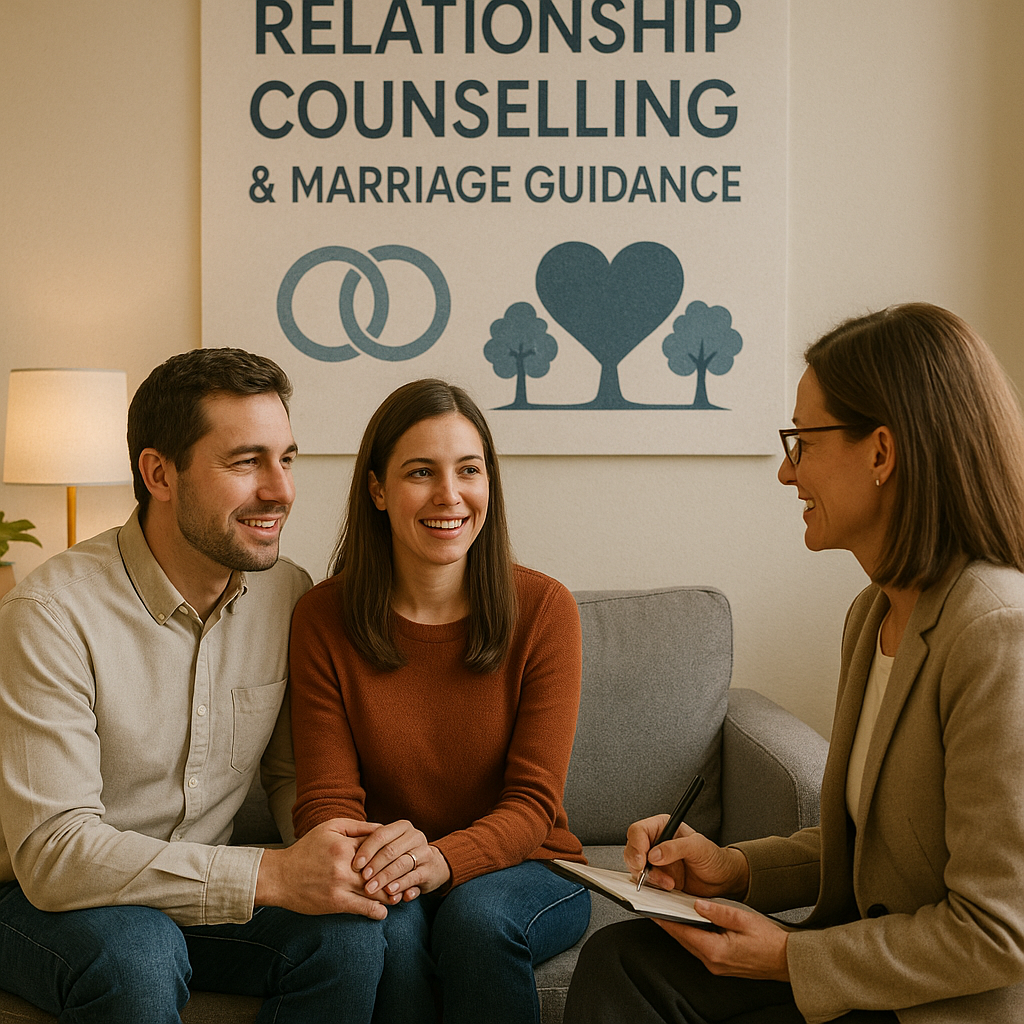Page Includes a comprehensive Relationship / Marriage Test
Relationship Counselling, Marriage Guidance, Couples Counselling

Every marriage and relationship faces challenges from time to time, but when conflicts happen or miscommunication or a loss of connection become persistent, they can feel not only stressful but sometimes the problems can insurmountable.
Common Relationship Problems.
Broken Promises:When one partner repeatedly fails to keep their promises, it can erode trust over time. Whether it’s missing important events or not following through on commitments, broken promises can lead to disappointment and frustration.
Jealousy and insecurity. Constantly questioning your partner’s motives or fearing their interactions with others can create a toxic atmosphere in the relationship.
Lack of Communication: A breakdown in communication can lead to misunderstandings and assumptions, which in turn can erode trust. When partners stop talking or listening to each other, trust can quickly deteriorate.
Inconsistent Behaviour: Trust can also be damaged when a partner’s actions are inconsistent with their words. When there is a misalignment between what is promised and what is delivered, it can create doubt and frustration.It is a fragile element in any relationship, but it’s also one of the most crucial.
Trust is shattered when one partner lies or engages in deceptive behaviour. Whether it’s a small white lie or a major betrayal, dishonesty erodes the foundation of trust. Partners may question each other’s honesty, leading to insecurity and suspicion.
Relationship Uncertainty: may question whether the damage done to a relationship can can be repaired or if it’s best to part ways. This uncertainty can lead to prolonged emotional distress and decision-making difficulties.
Lingering Resentment: One partner may harbour resentment toward their partner for causing the pain and turmoil. Meanwhile, a partner may feel unfairly judged or blamed. This resentment can poison the atmosphere of the relationship. This can inflict deep wounds on a relationship, damaging trust, communication, and emotional intimacy.
Unrealistic Expectations: Your partner to meet all your needs or to always behave in a certain way can set the relationship up for failure. Unrealistic expectations often lead to disappointment and frustration.
Growing Apart: Partners may find that they’re no longer on the same wavelength. Different priorities, interests, or personal growth trajectories can lead to emotional distance.
Financial Strain: Money can be a major source of stress in relationships. Whether it’s different spending habits, debt, or disagreements about financial priorities, financial strain can cause significant conflict.
Neglecting Intimacy: Physical and emotional intimacy are crucial for a healthy relationship, yet they’re often neglected due to busy schedules, stress, or unresolved conflicts. This can lead to feelings of disconnection.
Take The Relationship / Marriage Check
Physical Attraction
Do you still fancy each other in the right way?
Emotional Connection
Find out if you are you emotionally connected and suited to each other.
Communication
Find out if you communicate and the way you talk to each other is correct.
Trust
Find out if the correct levels of trust are still in your relationship.
Future Path Together
Find out if there is a visible future together .
Practicable Aspects
Find out if the practical aspects of your relationship are working correctly.
Willingness To Make Changes
Work out if it is worth making the changes to improve your relationship.
SCORES
If You have scored 27 – 30 You have a good solid relationship. Keep at it, all relationships need a bit of work now and again, and you are likely to work through any problems that come up.
If you have scored 21 – 26 Your relationship needs some maintenance, help and work on it, to get it back on track.
If you have scored 15-21 Are you sure this is the right relationship for you. It may be possible to get it back on track, but it is going to require some work and professional help.
If you have scored under 15 you need to be questioning if this relationship is right. Professional help can help you decide this.
Rapid Relief Form Marriage And Relationship Problems.
Both Alan And Kate At Wise Blue Owl Have Over 25 Years Experience Helping Couples Overcome Their Relationship And Marriage Problems. .
Book a Free Initial Consultation Today by using the booking calendar below. We will call you back at the time/day you request for a free 10 to 15 Min chat to advice on how best we can help you.
Or Call Us On – Tel: 07922118808 – Or Use Our Contact Us form
Relationship Counselling - Marriage Guidance UK Services

Relationship Counselling - Free Online Relationship Test - Marriage Guidance - Face To Face And Online Services Available.
Service Type: Marriage Guidance, Couples Therapy, Relationship Counselling
Currency: £
